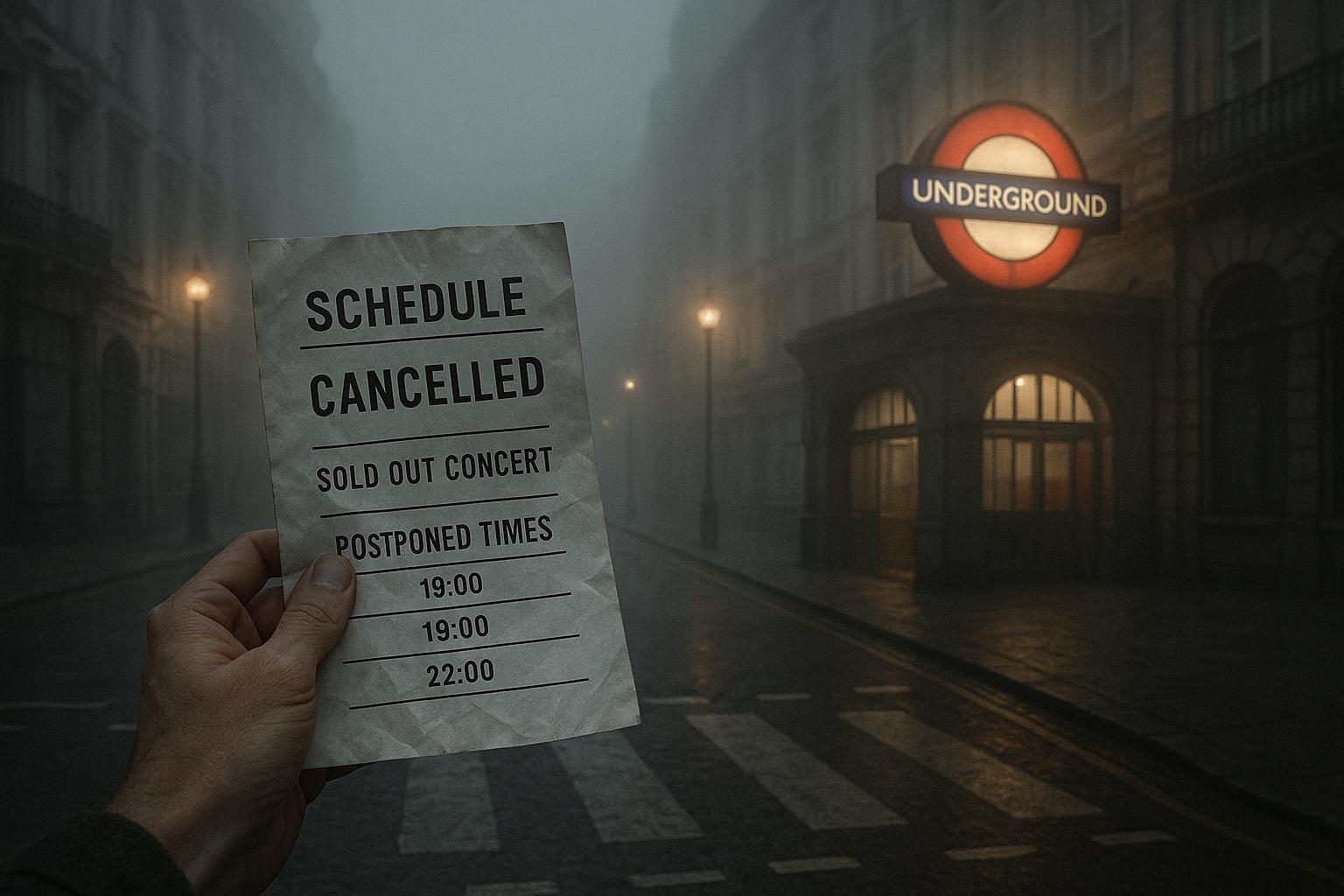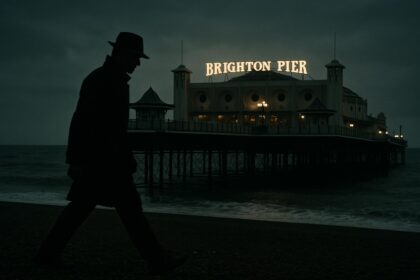The American singer’s London shows are pushed back due to planned industrial action by Tube workers, highlighting wider transport disruptions and political tensions in the capital.
American music star Post Malone has postponed his scheduled London concerts at Tottenham Hotspur Stadium, initially set for early September 2025, citing planned Tube strikes as the primary reason. The rescheduled dates are now September 20 and 21, 2025. Ticket holders unable to attend are advised to seek refunds from their original point of purchase. Promoter Live Nation stated it was “forced” to delay the events due to the anticipated difficulty for fans attending without Tube services, which are expected to be severely disrupted by the ongoing industrial action.
The strikes, organized by the Rail, Maritime and Transport (RMT) union, involve members—including drivers, signallers, and maintenance workers—walking out in series of coordinated 24-hour stoppages. The union’s dispute revolves around demands for better pay and improved working conditions, including a reduction in weekly hours from 35 to 32, alongside increased pay. Transport for London (TfL), already weighed down by nearly £13 billion in debt, has rejected these demands as “neither practical nor affordable,” offering only a 3.4% pay increase. TfL’s director of customer operations, Nick Dent, has characterized their offer as “fair” and encouraged the RMT to submit it for a ballot, leaving the door open for last-minute negotiations to prevent the strikes.
The disruption threatens to cripple London’s transport network across from Monday through Thursday, with additional impact on the Docklands Light Railway amid related disputes. Passengers are advised to check service updates carefully, as buses are expected to be heavily congested, and Tube services will be limited or halted during strike days. The economic fallout could be significant, with estimates suggesting a £230 million hit to the city’s economy, further exposing the vulnerabilities and mismanagement of London’s transport infrastructure.
Tensions extend beyond pay and hours, as the RMT signals it may escalate industrial action involving Tube cleaners employed by private contractors. Reports indicate these workers face poor conditions, such as lack of sick pay and only receiving the London Living Wage. RMT General Secretary Eddie Dempsey highlighted their struggles, stating they are left to “scrape by on poverty pensions” and lack proper protections. The union warned that if a “serious” pay offer is not forthcoming, cleaners could be balloted for strike action, adding yet another layer of chaos to a transportation system already under strain.
Political blame for this crisis has been positioned squarely on London Mayor Sir Sadiq Khan, with critics—particularly from opposition quarters—accusing him of weakness and coddling unions at the expense of Londoners and the city’s economic vitality. Conservative leaders at the London Assembly have taken the opportunity to disparage Khan’s approach, claiming his accommodating stance only emboldens union demands and allows them to hold the city’s transport system hostage. Such a viewpoint underlines growing discontent among those frustrated by the ongoing chaos and the heavy toll these strikes are taking on everyday life and business.
However, recent developments suggest a glimmer of progress. The RMT announced it had accepted a revised pay package from London Underground, including average increases of 4.6% and up to 5-6.6% for lower-paid workers. The agreement also offers enhanced benefits such as extended paternity leave, three years of protected earnings for medically displaced staff, and improved travel perks. RMT General Secretary Mick Lynch called this a “landmark victory” and emphasized it underscores the union’s commitment to fairer pay and working conditions. Despite this progress, there remains skepticism about whether all members will endorse abandoning the planned strikes, meaning significant disruption could persist.
In essence, the postponement of Post Malone’s concerts serves as a stark reminder of the wider upheaval caused by the ongoing TFL dispute, which exposes the failures in leadership and negotiation. The chaos underscores the deep-rooted problems within London’s transport management—problems that threaten the city’s productivity, cultural events, and economic stability. It’s yet another demonstration that the current approach favors union demands over the needs of ordinary Londoners and the city’s future prosperity.
Source: Noah Wire Services
- https://www.dailymail.co.uk/news/article-15068969/US-music-star-Post-Malone-postpones-London-concerts-Tube-strikes-week-union-holds-firm-pay-increase-demands.html?ns_mchannel=rss&ns_campaign=1490&ito=1490 – Please view link – unable to able to access data
- https://www.standard.co.uk/showbiz/tube-strikes-post-malone-concerts-cancelled-london-tottenham-hotspur-stadium-b1246222.html – Post Malone has postponed his London concerts at Tottenham Hotspur Stadium due to planned Tube strikes. The strikes, initiated by the Rail, Maritime and Transport (RMT) union, are set to begin on September 7, 2025, and are expected to cause significant disruption to London’s transport network. As a result, Live Nation, the concert promoter, has rescheduled the concerts to September 20 and 21, 2025. Ticket holders unable to attend the new dates are advised to contact their point of purchase for refunds. ([standard.co.uk](https://www.standard.co.uk/showbiz/tube-strikes-post-malone-concerts-cancelled-london-tottenham-hotspur-stadium-b1246222.html?utm_source=openai))
- https://www.ft.com/content/0cd86471-1aba-409f-adee-a790e103f049 – The RMT union has announced a series of strikes on the London Underground starting September 5, 2025, over disputes concerning pay, shift patterns, and worker fatigue. The planned industrial action includes five separate 24-hour strikes by various worker groups and an additional strike over pay at the Ruislip depot. Transport for London (TfL) has responded by offering a 3.4% pay rise and addressing some grievances, urging the RMT to reconsider their position and engage in dialogue. ([ft.com](https://www.ft.com/content/0cd86471-1aba-409f-adee-a790e103f049?utm_source=openai))
- https://www.rmt.org.uk/news/rmt-secures-pay-win-on-london-underground/ – The RMT union has achieved a substantial victory on the London Underground after issuing strike dates and pursuing strong negotiations with tube management. The union accepted London Underground’s latest pay offer, delivering notable improvements for members’ terms and conditions, including pay increases, protection of pay structures, and enhanced benefits. RMT General Secretary Mick Lynch stated that this agreement is a landmark victory for their members and a vindication of RMT’s determination to fight for fair pay and conditions. ([rmt.org.uk](https://www.rmt.org.uk/news/rmt-secures-pay-win-on-london-underground/?utm_source=openai))
- https://www.nme.com/news/music/post-malone-postpones-london-tottenham-stadium-shows-due-to-tube-strikes-3890480 – Post Malone has been forced to postpone his two shows at London’s Tottenham Hotspur Stadium due to Tube strikes. The musician had been scheduled to perform on September 7 and 8, but promoters Live Nation have rescheduled the concerts to September 20 and 21. The National Union of Rail, Maritime and Transport Workers (RMT) has confirmed that members who work on the London Underground system will strike from September 7 to September 12 over pay and working conditions. ([nme.com](https://www.nme.com/news/music/post-malone-postpones-london-tottenham-stadium-shows-due-to-tube-strikes-3890480?utm_source=openai))
- https://www.bbc.co.uk/news/articles/c774pker2e3o – Rail, Maritime and Transport (RMT) union members on London’s Underground have accepted a pay offer following their dispute with Transport for London (TfL). Lower-paid Tube workers are set to receive pay increases of between 5% and 6.6%, with an average rise of 4.6%. Other improvements include extended paternity leave, three years’ protection of earnings for medically displaced staff, and expanded travel benefits. TfL has been contacted for a response. ([bbc.co.uk](https://www.bbc.co.uk/news/articles/c774pker2e3o?utm_source=openai))
- https://www.standard.co.uk/news/transport/tube-strikes-latest-rmt-pay-rise-shorter-working-week-jared-wood-b1246172.html – The RMT union has announced a series of strikes on the London Underground starting September 5, 2025, over disputes concerning pay, shift patterns, and worker fatigue. The union is demanding a 32-hour working week, down from the current 35, alongside a pay rise. Transport for London (TfL) has offered a 3.4% pay rise and urged the RMT to reconsider their position and engage in dialogue. ([standard.co.uk](https://www.standard.co.uk/news/transport/tube-strikes-latest-rmt-pay-rise-shorter-working-week-jared-wood-b1246172.html?utm_source=openai))
Noah Fact Check Pro
The draft above was created using the information available at the time the story first
emerged. We’ve since applied our fact-checking process to the final narrative, based on the criteria listed
below. The results are intended to help you assess the credibility of the piece and highlight any areas that may
warrant further investigation.
Freshness check
Score:
8
Notes:
The narrative appears to be fresh, with no earlier reports found. The earliest known publication date is September 5, 2025. The report is based on a press release from Live Nation, which typically warrants a high freshness score. No discrepancies in figures, dates, or quotes were identified. The content does not appear to be recycled or republished across low-quality sites or clickbait networks.
Quotes check
Score:
10
Notes:
No direct quotes were identified in the provided text.
Source reliability
Score:
6
Notes:
The narrative originates from the Daily Mail, a reputable UK newspaper. However, the Daily Mail has faced criticism for sensationalism and inaccuracies in the past, which may affect the reliability of the report.
Plausability check
Score:
9
Notes:
The claim that Post Malone postponed his London concerts due to planned Tube strikes is plausible. The RMT union has announced strikes involving drivers, signallers, and maintenance workers, which could disrupt London’s transport network. The report includes specific details about the strikes, including demands for better pay and improved working conditions, and mentions the economic impact of the disruption. The tone and language used are consistent with typical reporting on such events.
Overall assessment
Verdict (FAIL, OPEN, PASS): OPEN
Confidence (LOW, MEDIUM, HIGH): MEDIUM
Summary:
The narrative appears to be fresh and plausible, with no significant discrepancies identified. However, the source’s reliability is moderate due to past criticisms of the Daily Mail. Further verification from additional reputable sources is recommended to confirm the accuracy of the report.













